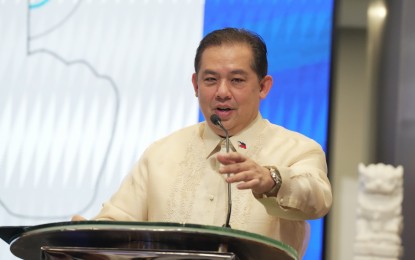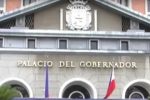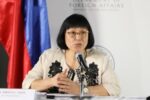Romualdez cites gov’t efforts to boost PH investment attractiveness


FINANCIAL REFORMS. House of Representatives Speaker Martin Romualdez delivers his message during the Forum on Legislative Reforms for the Philippines Capital Market at the Philippine Stock Exchange (PSE) Tower in Bonifacio Global City, Taguig on Wednesday (Oct. 4, 2023). Romualdez said the Philippine economy remains vibrant despite a global slowdown due to the initiatives under the administration of President Ferdinand R. Marcos Jr., which boosted our country’s advantage as a lucrative hub for foreign investments. (Photo courtesy of the House Press and Public Affairs Bureau)
MANILA – House of Representatives Speaker Martin Romualdez on Wednesday highlighted the initiatives of President Ferdinand R. Marcos Jr.’s administration to strengthen the country’s advantage as a lucrative hub for foreign investments.
In his message during the Forum on Legislative Reforms in the Philippine Capital Market at the Philippine Stock Exchange in Bonifacio Global City, Romualdez said the government has introduced financial and tax reforms that would bolster the country’s attractiveness to foreign investors.
He particularly noted the amended Public Service Act, which fosters full foreign ownership in crucial public services, such as telecommunications and airlines.
Romualdez said other legislative milestones, such as the Foreign Investment Act and the Retail Trade Liberalization Act, are “cornerstones of shaping a favorable and inviting environment” for foreign investments, thus fostering a “more open, vibrant and inclusive” economy.
“Implementing comprehensive financial and taxation reform is crucial. It will attract investments, spur employment, and ensure consistent government revenue streams. Our vision is to cultivate an economy that is inclusive, innovative, and highly competitive,” he said.
He also expressed optimism that the latest developments in the economic front entail that the country’s economy would remain vibrant despite the expected global slowdown.
“While factors such as the global economic slowdown and external environments have posed challenges, the resilience and adaptability of our economy persist. For context, our growth this year is anticipated to surpass that of nations like Indonesia, Vietnam, and Malaysia,” Romualdez said.
He also pointed out that while the World Bank recently trimmed the country’s gross domestic product (GDP) growth projection due to persistent inflation and global headwinds, the revised 5.6 percent growth remains “commendable.”
“The World Bank has recently projected the Philippines to be the fastest-growing economy in Southeast Asia this year,” Romualdez said, adding that by 2025, the World Bank forecast the country’s GDP growth to average 5.7 percent, buttressed by domestic demand and declining inflation.
He outlined the legislative initiatives to reshape the country’s economic landscape by introducing “pivotal amendments” to the Build-Operate-Transfer/Public-Private Partnership (PPP) Act, and the Fiscal Regime for the Mining Industry Act.
He said the government is also working to amend constitutional provisions that “have historically erected barriers to economic openness.”
“The House has already approved Resolution of Both Houses 6 and House Bill 7352, designed to relieve the constraints of restrictive economic provisions and open the doors to boundless opportunities and holistic growth,” Romualdez said.
The proposed constitutional amendments, he said, are not mere modifications, as they “symbolize a transformative reshaping of our economic landscape and a re-envisioning of our national potential.”
In the same event, House Ways and Means chairperson, Albay Rep. Joey Salceda, said the President has been the “most hands-on” in coordinating priority legislation, as he highlighted the accomplishments of the current administration in building capital markets.
Salceda particularly cited the Maharlika Investment Fund (MIF) Act, which creates a development-oriented fund, noting that it has already contributed PHP107 billion in capital.
According to Department of Finance (DOF) Secretary Benjamin Diokno, the MIF will be operational by the first quarter of next year.
Diokno said the MIF would serve as a platform for local and foreign capital, large global funds, global financial institutions, multilateral partners, and other sovereign wealth funds to make direct equity investments in Philippine ventures and projects.
He said by the time it starts running, the MIF would focus its investments on infrastructure flagship projects, particularly public road networks, tollways, railways, green energy, water resources, agro-industrial ventures, and telecommunications.
Aside from the MIF Act, Salceda also pointed out the New Agrarian Reform Emancipation Act, which condones all loans, including interests, penalties, and surcharges incurred by agrarian reform beneficiaries (ARBs) from land awarded to them.
The condonation covers an estimated 1.173 million hectares of land that will benefit about 610,054 ARBs who incurred an estimated PHP57.55 billion in unpaid amortizations. (PNA)






